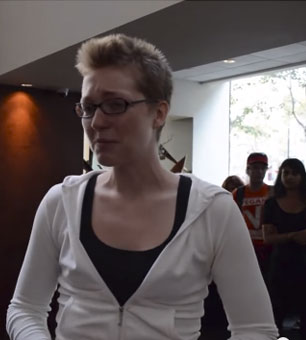It is an unconscious perception of the world that causes us to see mass slaughter of some animals but not others as normal, and tells us we should not get too worked up about it, let alone show emotion when challenging this perception, like animal rights activist Kelly Atlas.
Animal rights activist Kelly Atlas unexpectedly became infamous last week as “The Chicken Lady” when video of a protest she conducted inside a Bay Area restaurant went viral, garnering international press attention and even sparking a feud with Glenn Beck. She also became yet another woman dismissed for being “emotional.”
Atlas walked into an upscale establishment and told a tearful story about a disabled hen named Snow she rescued from an egg farm. Snow’s egg-production had declined, and she and thousands of other “spent” hens were slated to be gassed to death (which is standard practice, even on so-called “humane” egg farms). Along with rescuers from a Northern California animal sanctuary, Atlas took Snow and several other hens from the facility and brought them to the sanctuary to live out their lives. At first, Snow was terrified of Atlas, struggling to escape whenever she came near (Snow has a pinched nerve and does not have use of the lower part of her right leg). But slowly, Snow came to trust her rescuer. She now spends considerable effort, despite her injury, to cross the ground at the sanctuary in order to be near Atlas.
During her protest, Atlas implored diners to think of Snow every time they see meat or eggs on a plate, and stated adamantly, “It’s not food. It’s violence.”
The press coverage, coming largely from right-wing outlets, almost uniformly describes Atlas and her protest as over-the-top. “Emo” Atlas “storm[ed] into [the] restaurant.” “Crazed woman” Atlas was “overly-passionate” as she had a “stomach-churning meltdown.” Some outlets even diagnosed Atlas as “mentally-unhinged.”
Atlas’ protest is indeed impassioned, and she does lose her composure. The problem with the coverage is not the descriptions of her crying or even ranting, both of which are accurate enough. The problem is the implicit judgment that to care this deeply about Snow and other animals killed for food is some kind of psychosis. That to have as much compassion for animals called “food” as we do for cats and dogs with whom we share our homes, and therefore to beg us to leave chickens, pigs and cows off our plates, is “crazy.” That to stand up and speak out in places where animals are on the lunch plate, imploring those eating them to think about slaughter as “violence,” is not to walk the path of admirable and historic efforts at including marginalized groups in our circle of concern, but to be “overly-passionate” about individuals who, according to this way of thinking, simply do not matter.
A long conceptual history informs these descriptions of Atlas, associating traits deemed more “feminine,” such as caring and empathy, with weakness, and emotionality with social unacceptability and mental disturbance. This framework pits “feminine” traits against “masculine” traits, creating false dualisms and relegating the former to a lower, maligned status: emotion vs. reason; nature vs. culture; animal vs. human. In certain historical, and therefore ostensibly more aberrant, manifestations, hysterics multiply. Asylums fill. Witches burn.
But this conceptual framework continues to shape our thinking today. It allows us to understand the world in such a way that, when Atlas loses her composure because individuals just like someone she cares about – who happens to be a chicken, rather than a cat – are killed en masse, we see her as “crazy.” It is an unconscious perception of the world that causes us to see mass slaughter of some animals but not others as normal, and tells us we should not get too worked up about it. It is a way of thinking that has us console children, upset at having learned how meat is made, by assuring them that this is okay and cautioning them not to get too attached to animals killed for food – an experience Glenn Beck himself reported having, as he mocked Atlas’ concern for Snow.
It is the same conceptual framework that allows us to think of slitting throats and gassing animals to death as somehow not “violence.”
But might a world in which 70 billion animals are killed annually for food – over 100,000 per minute – while barely anyone bats an eye, be a little crazier than a person getting upset about it? Should we not be more concerned about our reflex to condemn someone who cares about these animals enough to speak up, than we are about the caring and speaking up itself? Shouldn’t the response to Atlas’ protest – which includes comments such as, “Go away, woman, before we barbecue you,” and, “Get between me and cooked meat, and I’ll show you some violence” – concern us more than her emotionality?
In short, don’t we want a world in which care and compassion for all is the norm and violence and threats of violence against anyone – not efforts, even emotional ones, to stop it – are socially unacceptable?
Much of the press coverage of Atlas’ protest complained that she “interrupt[ed] everyone’s lunch.” Are we really so insensitive, so engrossed in our chicken salad, that we cannot permit ourselves to hear a little emotion expressed on behalf of lives that have been much more brutally interrupted?
Join us in defending the truth before it’s too late
The future of independent journalism is uncertain, and the consequences of losing it are too grave to ignore. We have hours left to raise the $12,0000 still needed to ensure Truthout remains safe, strong, and free. Every dollar raised goes directly toward the costs of producing news you can trust.
Please give what you can — because by supporting us with a tax-deductible donation, you’re not just preserving a source of news, you’re helping to safeguard what’s left of our democracy.
